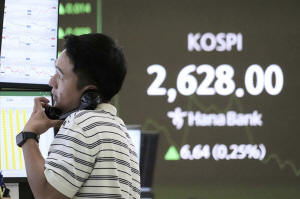European shares are higher after a mixed session in Asia
[May 16, 2025] By
JIANG JUNZHE
HONG KONG (AP) — European shares advanced after a mixed session in Asia
on Friday, with scant news driving trading.
Markets have calmed somewhat after the turmoil unleashed by Trump's
on-again, off-again tariffs offensive, aimed at compelling companies to
base manufacturing inside the United States.
The future for the S&P 500 advanced 0.2% while that for the Dow Jones
Industrial Average climbed 0.3%.
Germany's DAX gained 0.7% to 23,865.44 and the CAC 40 in Paris added
0.5% to 7,889.84. Britain's FTSE 100 advanced 0.3% to 8,660.21.
In Asian trading, Tokyo's Nikkei 225 was nearly unchanged at 37,753.72
after the government reported that Japan's economy contracted at a
faster rate than expected in the first quarter of the year. Exports fell
and consumer spending was flat, according to the data which showed a
contraction of 0.7% from a year earlier.
Hong Kong's Hang Seng dropped 0.5% to 23,345.05 while the Shanghai
Composite Index fell 0.4% to 3,367.46.
E-commerce giant Alibaba tumbled 4.3% after the company's financial
performance missed forecasts.
Seoul's Kospi picked up 0.2% to 2,626.87 and the S&P/ASX 200 in
Australia added 0.6% to 8,343.70.
Taiwan's Taiex gained 0.5%.

Most U.S. stocks drifted higher in quiet trading Thursday following the
jumble of mixedreports that offered little clarity on how the U.S.
economy is managing Trump’s trade war.
The S&P 500 rose 0.4%, enough to extend its winning streak to a fourth
day and to pull within 3.7% of its all-time high set earlier this year.
The Dow Jones Industrial Average added 0.6% and the Nasdaq composite
slipped 0.2%.
Stocks drifted higher as reports suggested the Federal Reserve may have
more leeway to cut interest rates later this year to support the U.S.
economy if it weakens under the weight of President Donald Trump’s high
tariffs.
Shoppers spent less at U.S. retailers last month than expected, while
inflation was better at the wholesale level than economists had
forecast.
[to top of second column] |

A currency trader talks on the phone near a screen showing the Korea
Composite Stock Price Index (KOSPI) at the foreign exchange dealing
room of the KEB Hana Bank headquarters in Seoul, South Korea,
Friday, May 16, 2025. (AP Photo/Ahn Young-joon)
 Other updates said U.S.
manufacturing looks like it’s still contracting but fewer U.S.
workers are applying for unemployment benefits than expected.
Even though China and the United States recently agreed on a 90-day
stand-down for many of their tariffs, frictions remain and it will
take time for tariffs to fully show up in economic data.
Fed Chair Jerome Powell warned in a speech on Thursday that the
world “may be entering a period of more frequent, and potentially
more persistent, supply shocks” that could goose inflation higher
and present a “difficult challenge for the economy and for central
banks.”
Such uncertainty showed itself in Walmart’s stock, which slipped
0.5% even though it reported a bigger profit for the latest quarter
than analysts expected.
Like other U.S. companies struggling through Trump’s
on-again-off-again rollout of tariffs, Walmart said it decided not
to offer a forecast for how much profit it will make in the current
quarter.
The nation’s largest retailer also said that it must raise prices
due to higher costs caused by Trump’s tariffs.
In the oil market, crude prices sank roughly 2% on expectations that
more petroleum could be set to flow into global markets because of a
possible deal between the United States and Iran over that country’s
nuclear program. Such a deal could help ease sanctions against Iran,
which is a major producer of oil.
Early Friday, U.S. benchmark crude oil lost 8 cent to $61.54 per
barrel. Brent crude, the international standard, dropped 10 cents to
$64.44 per barrel.
The U.S. dollar fell to 145.29 Japanese yen from 145.69 yen. The
euro advanced to $1.1211 from $1.1185.
All contents © copyright 2025 Associated Press. All rights reserved |